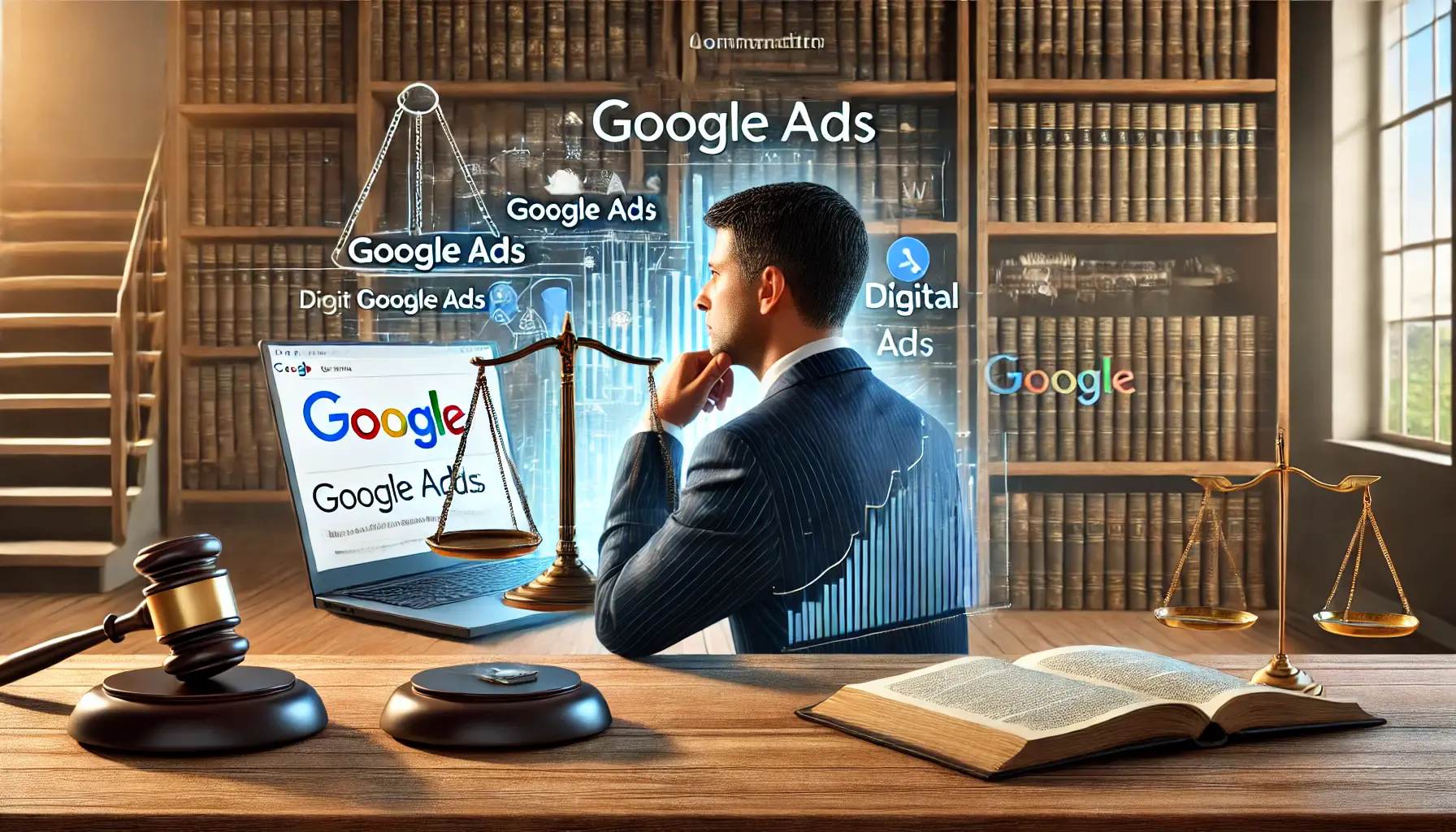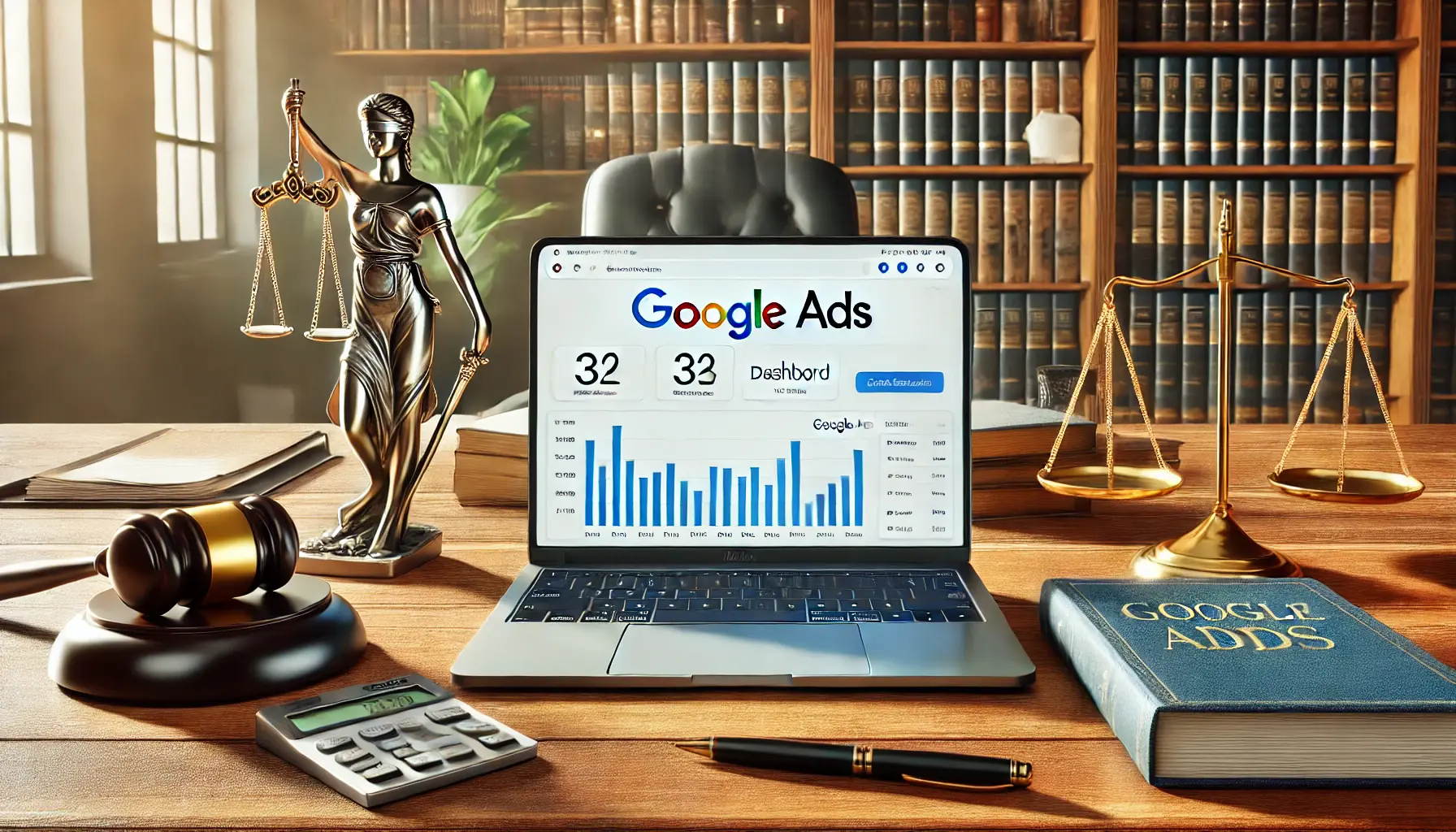In today’s digital age, the legal industry faces unique challenges in reaching potential clients.
Traditional advertising methods are no longer sufficient, and law firms must adapt to the evolving landscape.
One powerful tool that has emerged is Google Ads, offering lawyers a strategic avenue to connect with individuals seeking legal services online.
Understanding how Google Ads can benefit your legal practice is crucial.
This platform provides an opportunity to expand your firm’s visibility, draw more clients, and remain competitive in an increasingly crowded market.
Let’s delve into the world of Google Ads and explore how it can transform your approach to legal advertising.
- Understanding Google Ads for Legal Services
- Setting Up Effective Google Ads Campaigns for Lawyers
- Targeting Strategies to Reach Potential Clients
- Ensuring Compliance with Legal Advertising Regulations
- Measuring and Optimizing Your Google Ads Performance
- Maximizing Success with Google Ads for Lawyers
- Google Ads for Lawyers: Frequently Asked Questions
Understanding Google Ads for Legal Services
Google Ads is an online advertising platform that allows businesses, including law firms, to display their advertisements on Google’s search engine results pages and across its vast network.
This pay-per-click (PPC) model means you only pay when someone clicks on your ad, making it a cost-effective way to reach potential clients actively searching for legal assistance.

Exploring the functionality of Google Ads and their role in digital marketing.
What Are Google Ads?
Google Ads enables lawyers to create targeted advertisements that appear when users search for specific keywords related to legal services.
For instance, if someone searches for ‘personal injury lawyer,’ your ad can appear at the top of the search results, increasing the likelihood of attracting that potential client.

Showcasing how Google Ads drive growth and efficiency for law firms.
Benefits of Google Ads for Law Firms
Implementing Google Ads in your marketing strategy offers several advantages:
- Immediate Visibility: Your ads can appear on the first page of search results, ensuring your law firm is seen by those seeking legal services.
- Targeted Reach: You can tailor your ads to specific demographics, locations, and even the time of day, ensuring you reach your ideal audience effectively.
- Cost Control: With PPC, you set your budget and only pay when someone clicks on your ad, allowing for flexible spending and greater financial control.
- Measurable Results: Google Ads provides detailed analytics, enabling you to track the performance of your campaigns and make data-driven decisions for continuous improvement.

Addressing the misconceptions surrounding Google Ads for the legal industry.
Common Misconceptions About Google Ads in the Legal Industry
Despite its benefits, some law firms hesitate to use Google Ads due to misconceptions:
- High Costs: While competitive, especially for popular legal keywords, careful management and strategic bidding can make Google Ads affordable for lawyers.
- Complexity: The platform may seem daunting, but with proper guidance or professional assistance, it becomes manageable and highly effective.
- Ethical Concerns: Adhering to advertising regulations and ethical guidelines ensures your campaigns remain compliant and professional, protecting your reputation.
By understanding and leveraging Google Ads, your law firm can effectively navigate the digital landscape, reaching potential clients precisely when they need your legal expertise.
Google Ads is an essential platform for law firms aiming to increase visibility and attract potential clients actively seeking legal assistance.

A lawyer strategizing the setup of a Google Ads campaign for their legal practice.
Setting Up Effective Google Ads Campaigns for Lawyers
Embarking on a Google Ads campaign can significantly enhance your law firm’s online presence.
However, to maximize its potential, it’s essential to set up your campaigns thoughtfully and strategically.
Let’s explore the key steps to establish a successful Google Ads campaign tailored for legal services.

A lawyer conducting keyword research to optimize online advertising for legal services.
Conducting Keyword Research for Legal Services
Identifying the right keywords is the cornerstone of any effective Google Ads campaign.
Start by identifying terms that prospective clients might use when searching for a lawyer.
Tools like Google’s Keyword Planner can help in finding relevant keywords and understanding their search volumes.
Consider targeting long-tail keywordsSpecific and detailed keyword phrases with lower search volume but higher conversion potential., which are very specific phrases that may have less volume but usually have better conversion rates.
For example, instead of targeting the broad term ‘lawyer,’ you might opt for ‘personal injury lawyer in [Your City].’ This approach helps attract clients actively searching for your specific services.

A lawyer creating compelling ad copy for a legal services campaign in a professional office.
Creating Compelling Ad Copy for Law Firms
Your ad copy serves as the first impression potential clients have of your firm.
Crafting clear, concise, and engaging ads is crucial.
Highlight unique selling points of your firm, such as years of experience, areas of specialization, or client testimonials.
Additionally, include a strong call-to-action (CTA) that guides the user to take the desired action on your website, such as scheduling a consultation or calling your office.
Remember, your ad copy should align with the keywords you’re targeting to ensure relevance and improve your Quality ScoreA Google Ads metric that measures the relevance and quality of ads, keywords, and landing pages..

A lawyer reviewing an optimized landing page to improve conversion rates for legal services.
Optimizing Landing Pages for Higher Conversion Rates
Once a user clicks on your ad, they should be directed to a landing page that delivers on the ad’s promise.
Ensure your landing pages are user-friendly, mobile-responsive, and provide clear information about your services.
Include contact forms, phone numbers, and other easy-to-find contact methods to facilitate communication.
Testimonials, case studies, and clear descriptions of your services can establish trust and persuade potential clients to get in touch.
By carefully setting up your Google Ads campaigns with targeted keywords, compelling ad copy, and optimized landing pages, your law firm can attract more potential clients and convert them into actual clients.
Strategically setting up campaigns, including conducting keyword research and crafting compelling ad copy, is key to Google Ads success for law firms.

A lawyer using digital targeting strategies to reach potential clients for legal services.
Targeting Strategies to Reach Potential Clients
Effectively reaching potential clients through Google Ads requires strategic targeting.
By honing in on specific demographics, locations, and behaviors, your law firm can connect with individuals actively seeking legal services.
Let’s explore key targeting strategies to enhance your campaign’s effectiveness.

A lawyer analyzing geographic targeting for local legal services using a digital map interface.
Geographic Targeting for Local Legal Services
As a lawyer, your services are often region-specific.
Utilizing geographic targeting ensures your ads are displayed to users within your practice area.
For instance, if you’re a family law attorney in Chicago, you can set your ads to appear only to users searching from Chicago and surrounding suburbs.
This approach maximizes your ad spend by focusing on the most relevant audience.

A lawyer analyzing demographic and interest-based targeting for more precise client acquisition.
Demographic and Interest-Based Targeting
Understanding the demographics of your ideal clients allows for more precise targeting.
With Google Ads, you can filter audiences based on:
- Age: Target ads to those age groups most likely to need your services.
- Gender: Adjust your targeting settings if your services cater more to one gender.
- Parental Status: Beneficial for family law practices specializing in child custody cases.
Interest-based targeting also enables you to reach users whose online behaviors indicate a need for legal services.
For example, users visiting websites related to legal advice or forums may be more inclined to require legal assistance.

A lawyer using remarketing strategies to re-engage prospective clients through digital marketing.
Utilizing Remarketing to Re-engage Prospective Clients
Not all potential clients will contact you on their first visit to your website.
Remarketing allows you to re-engage these visitors by displaying your ads as they browse other sites.
This strategy keeps your firm top-of-mind and encourages return visits, increasing the likelihood of conversion.
By using these targeting strategies, your law firm can effectively reach and engage potential clients, optimizing your Google Ads campaigns for improved performance.
Use geographic targeting, demographic filters, and remarketingA strategy that targets users who previously visited your website with ads as they browse other sites. strategies to optimize ad performance and client reach.

A lawyer ensuring compliance with legal advertising regulations through digital marketing tools.
Ensuring Compliance with Legal Advertising Regulations
Advertising in the legal industry requires a careful balance between effective marketing and adherence to strict ethical standards.
As a lawyer, it’s imperative to ensure that your Google Ads campaigns comply with both platform policies and legal advertising regulations to maintain your firm’s reputation and avoid potential penalties.

A lawyer reviewing ethical guidelines for legal advertising, ensuring compliance with legal standards.
Understanding Ethical Guidelines for Legal Advertising
Legal advertising is governed by ethical guidelines that vary by jurisdiction but generally emphasize:
- Truthfulness: All advertisements must be honest and not misleading.
- Confidentiality: Ads should not disclose any confidential information about clients.
- Professionalism: Marketing materials must uphold the dignity of the legal profession.
Familiarize yourself with the specific advertising rules set forth by your state’s bar association or relevant regulatory body to ensure compliance.

A lawyer reviewing an advertisement to ensure it meets legal and ethical standards, avoiding common pitfalls.
Avoiding Common Pitfalls in Lawyer Advertisements
To maintain ethical standards in your advertising efforts, be mindful of the following common pitfalls:
- Misleading Claims: Avoid making guarantees about case outcomes or exaggerating your expertise.
- Unverified Testimonials: Ensure that any client testimonials used are genuine and have received proper consent.
- Omission of Disclaimers: Include necessary disclaimers, especially when discussing past case results.
Regularly reviewing your ads for compliance can help prevent these issues.

A lawyer staying informed about Google Ads policies for legal services to ensure compliance.
Staying Updated with Google Ads Policies for Legal Services
Google Ads has specific policies regarding the promotion of legal services.
Key considerations include:
- Prohibited Content: Advertisements are not allowed to promote illegal services or contain false information.
- Restricted Content: Certain legal services may require additional restrictions or certification.
- Editorial Standards: Ads should be clear, professional, and error-free.
Keep your campaigns in compliance by regularly reviewing Google’s Advertising Policies and staying informed about any changes.
By diligently adhering to ethical guidelines and platform policies, your law firm can effectively use Google Ads to reach clients while maintaining the integrity and professionalism of your practice.
Adhering to ethical guidelines and Google Ads policies is essential to maintain professionalism and avoid penalties in legal advertising.

A lawyer reviewing Google Ads performance metrics to optimize ad campaigns.
Measuring and Optimizing Your Google Ads Performance
To ensure your law firm’s Google Ads campaigns are effective, it’s essential to measure their performance and make data-driven optimizations.
By analyzing key metrics and implementing strategic adjustments, you can enhance your return on investment (ROI) and attract more clients seeking legal services.

A lawyer analyzing key performance indicators for optimizing legal advertising campaigns.
Key Performance Indicators (KPIs) for Legal Advertising
Monitoring specific KPIs provides insights into your campaign’s effectiveness.
Focus on the following metrics:
- Click-Through Rate (CTR): The number of people who click on your ad after seeing it. A high CTR indicates that your ad is appealing and relevant to your audience.
- Conversion Rate: The percentage of ad clicks that ultimately lead to converted actions, such as submitting a contact form or calling your office. This metric reflects the effectiveness of your landing pages and overall user experience.
- Cost Per Click (CPC): The average amount you pay each time someone clicks on your ad. Controlling CPC helps sustain a proper advertising budget and ensures cost-effectiveness.
- Cost Per Acquisition (CPA): The average cost of acquiring a new client through your ads. Lowering CPA while maintaining or growing conversions enhances ROI.

A lawyer optimizing ad performance through A/B testing in a professional office setting.
How to Drive Better Ad Performance with A/B Testing
A/B testing involves creating two different versions of your ad or landing page to learn which one performs better.
Testing variables such as headlines, ad copy, images, or calls-to-action can provide valuable insights into what resonates most with your audience.
Implementing successful elements from A/B tests can lead to improved engagement and higher conversion rates.

A lawyer reviewing and adjusting their Google Ads campaigns for continuous optimization.
Regularly Reviewing and Adjusting Your Campaigns
Continuous monitoring and optimization are crucial for sustained success.
Regularly review your campaign data to identify trends and areas for improvement.
Adjust your targeting, bidding strategies, and ad creatives based on performance insights.
Being proactive allows your law firm to adapt to ever-changing market conditions and client behaviors, ensuring that your Google Ads campaigns remain effective and efficient.
- Track KPIs like CTR, CPC, and CPA.
- Use A/B testing to refine ad copy and targeting.
- Adjust campaigns based on performance data for continuous improvement.

A lawyer maximizing the success of their legal practice with optimized Google Ads campaigns.
Maximizing Success with Google Ads for Lawyers
Google Ads represent a transformative opportunity for attorneys and law firms to reach prospective clients and enhance their online presence.
By strategically leveraging this powerful platform, lawyers can achieve immediate visibility, targeted outreach, and measurable results.
Let’s summarize the key takeaways from the article to help your law firm thrive in this competitive landscape.

A lawyer launching an effective Google Ads campaign by reviewing campaign setup steps.
Key Steps to Launching Effective Campaigns
To create impactful Google Ads campaigns, it is essential to:
- Conduct thorough keyword research to identify phrases potential clients are searching for.
- Craft compelling ad copy that highlights your firm’s unique expertise and services.
- Optimize landing pages to ensure seamless user experiences and higher conversions.
These foundational steps set the stage for maximizing your campaign’s effectiveness.

A lawyer analyzing targeting strategies to effectively reach the right audience for legal services.
Reaching the Right Audience with Targeting
Precision targeting is a cornerstone of successful advertising.
Using geographic and demographic filters ensures your ads reach the most relevant audience.
Remarketing strategies further enhance your ability to re-engage potential clients who may not convert during their initial visit.

A lawyer reviewing legal advertising guidelines to maintain compliance and professionalism.
Maintaining Compliance and Professionalism
Ensuring your campaigns adhere to legal advertising regulations is vital for maintaining credibility and trust.
Staying updated with both ethical guidelines and Google Ads policies safeguards your firm from potential pitfalls and enhances your reputation in the industry.

A lawyer optimizing and measuring the success of their Google Ads campaigns.
Optimizing and Measuring Success
Regularly tracking performance metrics such as CTR, CPC, and CPA enables you to refine your campaigns for better results.
Implementing A/B testingA method of comparing two versions of an ad or landing page to determine which performs better. uncovers effective strategies and fosters continuous improvement, allowing your law firm to adapt to market trends effectively.
By incorporating these best practices, your law firm can fully harness the potential of Google Ads, connect with clients, drive business growth, and achieve sustained success in today’s digital era.
By leveraging strategic targeting, compliance, and performance optimization, Google Ads can transform a law firm’s online presence and client acquisition.

A lawyer addressing frequently asked questions about Google Ads for legal services.
Your campaigns can be managed by an agency specialized in Google Ads, check out our service page.
Google Ads for Lawyers: Frequently Asked Questions
Understanding how to effectively make use of Google Ads can significantly affect your law firm’s online presence.
Below are some common questions and succinct answers that will help you optimize your advertising strategy further.
Google Ads is a platform where attorneys can create targeted ads that appear in search results to help attract potential clients who are actively seeking legal services.
With Google Ads, your firm’s website becomes more visible, driving relevant traffic and generating leads from people seeking legal aid.
Budgets differ based on practice area and competition.
Start with a modest amount, monitor performance, and adjust as needed to achieve desired results.
Conduct keyword research to identify terms potential clients use when searching for legal services.
Focus on specific, relevant keywords to attract qualified leads.
Track key performance indicators such as click-through rates, conversion rates, cost per click, and return on investment to assess campaign effectiveness.
Yes, ensure your ads comply with legal advertising regulations and ethical guidelines to maintain professionalism and avoid potential penalties.
Yes, Google Ads enables targeting of ads in specific locations, ensuring your firm reaches prospective clients in your practice area.
A/B testing involves running two different ad creatives against each other to test which performs best, helping you optimize your campaigns for better results.
Regularly monitor your campaigns, ideally weekly or bi-weekly, to identify trends and make necessary adjustments for optimal performance.










